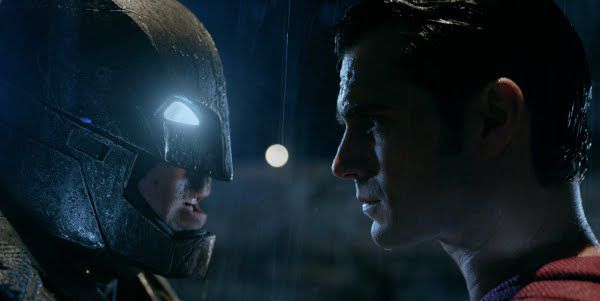Eye For Film >> Movies >> Batman V Superman: Dawn Of Justice (2016) Film Review
Batman V Superman: Dawn Of Justice
Reviewed by: Anton Bitel

Remember the scenes of mass destruction in and around Metropolis with which Zack Snyder's Man Of Steel (2013) ended? Well, it turns out that Bruce Wayne (Ben Affleck) was in the thick of it, watching from the ground up as the city fell about him from the sky down. From his human perspective, the scene is all collapsing buildings and billowing walls of dust, 9/11 style, with Superman (Henry Cavill) and Zod merely glimpsed shooting through the mayhem - two human-sized, and therefore barely discernible, dots amid massive alien ships and machines of destruction. If, when Wayne spots a horse surreally emerging from the smoky chaos, canny viewers recall a similar equine appearance in Cloverfield (2008), that is because, from Wayne's point of view, what is happening is just like the urban pandemonium of Matt Reeves' film.
Perspective counts here. While Superman continues to help humans whenever they are in trouble, he keeps being confronted with questions about the collateral damage resulting from his involvement in the Metropolis incident - the very same questions that many critics raised about the first film's climax. There is a Senatorial inquiry being conducted into 'the Superman problem', even as someone is trying, with considerable success, to frame him for mass killings abroad. Wayne buys fully into the negative image of Superman, an image that even permeates Wayne's dreams (in which Superman is a torturer and murderer). These dreams betray far more about Wayne's own damaged psyche. For this Wayne, older, more grizzled and more cynical than the Batman of Tim Burton or of Nolan's first two films, is a long-term vigilante who recently has taken to doing very bad things whenever he dons the Batsuit.

Those bad things include torturing criminals for information - with, as Wayne's butler and partner-in-crime(fighting) Alfred (Jeremy Irons) wryly points out, very little efficacy - and scarring them for life. It is not a huge leap to see this as a critique of America's post-9/11 render-and-torture strategy - and there is similar political commentary to be found in the sight of crowds outside the Capitol protesting Superman's presence with banners that read "Aliens are un-American", even as in Mexico - source of another kind of 'alien' from a certain American perspective - Superman is embraced as a saviour god. As Kal-el tries to work out where the truth and justice lie, the current 'American way' is exposed to be a series of empty soundbites about democracy from political representatives whose strings are being pulled by big business - in return for sweets. Little wonder that Superman is confused for what, or for whom, he is fighting.
Bringing Alien and Bat together is long-haired industrial heir Lex Luthor, played by Jesse Eisenberg as a mix of Mark Zuckerberg's millennial narcissism and the Joker's convoluted scheming. Resentful of having "knowledge without power" in a world where 'meta-humans' are on the rise, mercurial, sociopathic Lex lays down his own law, manipulating events from the sidelines and playing other characters off against one another like so many chess pieces. His long game gives rise to a film plot which, though complicated and busy, is never overexplained. Indeed, once the final credits have rolled, it is a fun exercise, as it was in Nolan's The Dark Knight (2008), to try to sort Luthor's fixed plans from his improvisations, his thought-through moves from his capricious whims, and to work out whether he is a mere agent of chaos, or a more calculating intriguer, multiple steps ahead even of 'The World's Greatest Detective'.
Batman has always been one of the darker heroes, but this film's version of the Knight is the darkest (before the Dawn), and far more blithely willing than his Nolan-esque counterpart to leave a trail of the mutilated and the dead in his wake (even if, paradoxically, he fights to stop Superman doing much the same). Every new Batman is introduced with yet another reprise of his iconic primal scenes - the murder of his parents, the Fall into a bat-filled cave - and Snyder's film is no exception, opening with precisely those sequences (here set in 1981). Yet far from being mere pandering to convention, those scenes will here prove to be absolutely crucial to the events, some 35 years later, that dominate Batman V Superman: Dawn Of Justice. The film carries over from Man Of Steel an exploration of the theological and philosophical implications of having a Superman among us on Earth, but adds to these a welcome new psychological dimension in its story of an obsessive, rather unhinged Batman whose oldest wounds keep being reopened.
Even as Batman has taken to burning the shape of a bat into the flesh of his victims - something that, as Superman recognises, makes him more problem than solution in a world of criminality - there is shameless branding of another kind on offer here. Batman V Superman: Dawn Of Justice is not just a film, but also, as its subtitle suggests, a prelude to a projected ensemble franchise, and so the action is repeatedly interrupted by gratuitous pieces of fan-service foreshadowing that feel like little more than annoying ad breaks. One of these glimpses into the future, coming in an extended dream sequence that would appear, nonsensically, to grant Wayne powers of supernatural clairvoyance, shows the challenges facing Chris Terrio and David S Goyer's screenplay. For they are burdened not just with their characters' long historical traditions, but also with the need to build foundations for a Warner Bros super-cashcow - and like its various heroic figures, the film can be seen struggling and straining to be good in far from ideal circumstances. Superman's dilemmas, in particular, mirror the film's, as he is shown grappling with the moral question of whether it is better to intervene in the human world (risking, heh, a lot of bad press), or simply to withdraw for good. No doubt Warner is pondering a similar question right now about the worthiness of the whole Justice League enterprise. It is not just humanity that is at (Kryptonite-tipped) stake here, but also a studio's monumental financial outlay. Poor box office returns could be another nail in the coffin for the cinematic DC universe - although superheroes do have a habit of coming back from the dead.
"You drop this now", Daily Planet editor Perry White (Laurence Fishburne) tells the disguised Superman about several investigative articles, written without commission, in which he has called into question the actions of Gotham's most famous vigilante. "Nobody cares about Clark Kent taking on the Batman." Anyone, of course, who is watching a film with the phrase Batman V Superman in its title does care - but Snyder builds slowly and deliberately to the promised bout, and finds a way to transform the eventual spectacle into an event that forges character and realigns relationships, while reorienting a divided America towards its own common goodness and shared goals.
As in Man Of Steel, the climactic battle here is on a gargantuan scale, with new personnel joining in on multiple sides (I shan't spoil what in fact the film's trailer has already criminally spoilt) - but Snyder makes all this cosmic biffo as clear as it is loud, while keeping it grounded at a level that plays even to the human strengths of Batman and Lois Lane (Amy Adams). That's some feat.
Where Batman and Superman are typically defined in relation to their fathers, here these little boys lost are also very much mama's boys (Diane Lane reprises her rôle as one of the Marthas), with unexpected Freudian fallout and a neatly feminised take on morality. And speaking of mothers and sons, Lex's scheming leads to a perverted birth sequence that references Alien: Resurrection (1997) - a pleasingly left-field intertext for a superhero flick, and one whose title might resonate with viewers as they see the film's final, unresolved image.
As its heroes are pushed very close to their least heroic before discovering that they are better when in League with each other, Batman V Superman: Dawn Of Justice explores the boundaries not just between human and superhuman, but between earthbound actualities and high ideals. Sure it is full of sound and fury, but it is also brimming with ideas, and if anything, its two-and-a-half-hour duration feels insufficient to contain its sprawling story - like a mutant monster, barreling out of control and straining to contain its own shifting form. Whether that makes the film good or bad will be down to the individual viewer's perspective - but questions of what constitutes good and bad, at least in an ethical sense, would in fact seem to be Snyder's principal concern.
Reviewed on: 24 Mar 2016


















